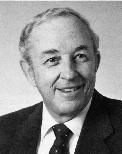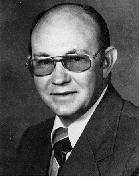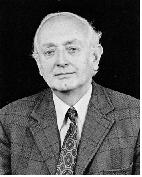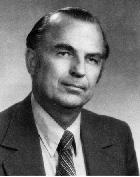1989 Honorary Life Member Selections
 RICHARD W. CHASE
RICHARD W. CHASE
Richard W. Chase was born in Worcester, Massachusetts on February 14, 1933. He graduated from North High School in Worcester and obtained a BVA degree in animal science from the University of Massachusetts. During his undergraduate studies, he was awarded the Danforth Fellowship, which provided him the opportunity for short term, off campus study. After receiving the undergraduate degree, he spent three years as Associate County Agricultural Agent in Worcester County Massachusetts with responsibilities for dairy, livestock production and agronomy. In 1959, Dick went to Rutgers University where he earned his M.S. and Ph.D. degrees in the Department of Farm Crops. After completing his Ph.D., he joined the Michigan State University faculty in the Farm Crops Department in 1962 as Assistant Professor and attained the rank of full Professor in 1971. His appointment is research and extension in the area of potato production management.
Dick has coordinated the Michigan State University Montcalm Potato Research Farm since it was established in 1966. For several years he was responsible for the seed certification program of the Michigan Crop Improvement Association and continues to serve on its Board of Directors as an ex-officio member. He is also the Michigan State University representative to the Michigan Potato Industry Commission and coordinates activities of the University potato research team, in conjunction with the Potato Commission.
Dick has been very active in The Potato Association of America. He served as PAA President in 1978-79, has been a member of the PAA Executive Committee and was the first chairperson of the Certification Section. He initiated, and periodically revises, “The North American Potato Variety Inventory; a publication of the Certification Section which lists all the known potato varieties that have been released in the U.S. and Canadian breeding programs.
During his distinguished career, Dick has received numerous awards including: Outstanding Extension Specialist, Master Farmer Associate Award, Specialist of the Year from the Michigan Association of Extension Agents and Award of Distinguished Service from the State of Michigan. Dick has been married to his wife, Hazel, since 1955 and they have one daughter, Jean, who is a high school senior. A great deal of credit for the accomplishments Dick has achieved must go Hazel, who has provided tremendous support for him throughout his career.
It is an honor and a privilege to present Richard W. Chase for Honorary Life Membership in The Potato Association of America.
Jerry N. Cash, Nominator
 MONTY D. HARRISON
MONTY D. HARRISON
Monty D. Harrison was born in Afton, Wyoming, in 1935. He attended the University of Wyoming and received B.S. and M.S. degrees in Agronomy (1957) and Plant Pathology (1958), respectively. Additional graduate studies were pursued at the University of Minnesota where he obtained a Ph.D. degree in Plant Pathology in 1962. Since 1962, Monty has been a member of the faculty of the Department of Plant Pathology and Weed Science at Colorado State University and has focused his research efforts exclusively on potatoes. Monty is widely known both nationally and internationally for his many successful research efforts on potato diseases. He has demonstrated a unique ability to “establish the basics” and then progressively fill the gaps and add the other necessary bits and pieces of information which are so vital to a truly improved understanding of potato pathology. His work has earned great respect and credibility among fellow scientists and potato industry people alike; he certainly merits being acknowledged as one of the world-class potato scientists.
Monty is perhaps best known for his research on potato blackleg. His comprehensive approach to this problem has resulted in entirely new concepts regarding disease control and provided pioneering information regarding long-distance dispersal of not only blackleg, but also other bacterial plant pathogens. He has authored well over 50 publications on this topic and co hosted an International Blackleg Conference in 1984.
Potato early blight investigations have resulted in 27 publications by Monty. The epidemiological principles underlying a widely used “degree day” model for timing of chemical sprays were established by Monty and his colleagues at CSU. The benefits of reduced grower cost and minimized environmental risk are important practical results of this research.
Other potato diseases that Monty has published on include bacterial ring rot, verticillium wilt, fusarium tuber decay, russet scab, common scab, and rhizoctonia. His research has made a meaningful impact, not only on the Colorado potato industry, but nationally as well. The feasibility of pursuing seed improvement based on tissue culture technology was vastly enhanced by the new information generated via his research.
In addition to his research duties, Dr. Harrison has directed the graduate studies of 14 M.S. degree students and five Ph.D. students. He teaches both graduate and undergraduate courses and served as Associate Dean at CSU for six years. He had advised and cooperated with a number of international programs dealing with potato improvement. Monty and his wife, Geneice, have a family of four daughters and one son; in recent years grandchildren have been the focal point of attention for the Harrison family.
Monty has been an active supporter of and contributor to The Potato Association of America since his graduate student days and undoubtedly is one of the most frequently published authors in the American Potato Journal. His career exemplifies the type of professional excellence that the Honorary Life Member award is intended to portray.
Kenneth W. Knutson, Nominator
 JOHN GREGORY HAWKES
JOHN GREGORY HAWKES
John Gregory Hawkes (known universally as Jack) was born in Bristol, U.K. in 1915. He received his B.A. degree from the University of Cambridge in 1937, graduating with First Class Honors in Natural Sciences. In 1941, he was awarded the degree of Ph.D. from the same university for a thesis on the taxonomy of potatoes collected during a nine-month expedition to the Americas in 1939. In recognition of his unique contribution to science, he was awarded the degree of Sc.D. from the University of Cambridge in 1957.
Jack’s contribution to potato science has been immense. Our understanding of the genetic variation and taxonomy of the tuber-bearing Solanums owes much to his dedicated research, which has spanned 50 years, in the field, herbarium and laboratory. However, taxonomy has not been just an academic exercise -Jack’s taxonomic decisions have often been made with the potato breeder in mind, and to provide a taxonomy which reflects natural relationships. Such an approach has helped breeders utilize wild species more effectively in potato improvement programmes. A biosystematic approach to potato taxonomy has been fundamental in his research, based often on hybridization studies.
The relevance of taxonomy to potato breeding stems from Jack’s early contributions to potato improvement in Colombia, where from 1948 to 1951, together with Nelson Estrada, he developed the original work on tuberosum × and/gena crosses. Furthermore, Jack’s considerable expertise in genetic conservation has always been aimed at providing the breeder with useful genetic variation. In this context, he has undertaken more than a dozen collecting trips throughout the Americas from 1939 to 1981. Indeed the important potato collections in the US (at Sturgeon Bay), in the UK (at the Commonwealth Potato Collection), and in West Germany (at the Dutch- German Potato Gene Bank at Braunschweig) owe much to Jack’s important collecting activities. For 10 years, he acted as a consultant to the International Potato Center in its° genetic resources programme, and since 1965, he has regularly visited the IR-1 collection in Sturgeon Bay, at the request of the USDA, to help with the taxonomy of the potato species.
Most of Jack’s professional life has been spent at the University of Birmingham, UK, where for the 20 years prior to his retirement in 1982 he was fwst Professor of Plant Taxonomy, and then from 1967, Mason Professor of Botany and Head of the Department of Plant Biology. From 1939 to 1948 he was Botanist at the Commonwealth Bureau of Plant Breeding and Genetics, Cambridge, and from 1948 to 1951, he was Director (and founder) of the Colombian Ministry of Agriculture Potato Research Station.
Jack’s publication record is impressive, with more than 150 scientific papers to his credit, of which 79 are on potatoes. Many of the others reflect Jack’s interests over many years in plant genetic resources. He is the author or editor often books. He has supervised many Ph.D. students, 15 on potato projects, and several of these students now hold key positions in Argentina, Colombia and at CIP. His taxonomic research on potatoes has led to the publication of 64 new species (18 as joint publicatioins) and five taxonomic series within the tuber-bearing Solanums.
Since retirement, Jack has been very active. He has undertaken consultancies throughout the world for the International Board for Plant Genetic Resources, the World Bank, and the Consultative Group on International Agricultural Research. His international reputation has been recognized by the award of the Frank. N. Meyer Memorial Award of the American Genetic Association in 1973, a Certificate of Merit from The PAA in 1973, and a Congress Medal from the XII International Botanical Congress, held in Leningrad in 1975. In 1989, he was the first scientist to be awarded Honorary Life Membership of the European Association for Research in Plant Breeding (EUCARPIA) in recognition of his pioneer work in plant genetic resources. When not studying potatoes, Jack’s hobbies include gardening and South American archaeology.
The award of Honorary Life Membership of The Potato Association of America is a worthy tribute to this outstanding potato scientist.
Michael T. Jackson, Nominator
 GENE SHAVER
GENE SHAVER
Gene Shaver entered into his career in the potato industry in 1950 when he was employed by the Nebraska Certified Potato Growers and worked in the Foundation Seed Division as a “roguery In 1952, he was appointed District Manager of the warehouse in Hay Springs, NE. In 1953, he formed the Howard McLean Potato Co. in partnership with Howard McLean, the former General Manager of the Nebr. Certified Potato Growers. He became President of the company when Howard retired. The company marketed washed red table potatoes and seed. Nebraska started producing chipping pota(oes in the early 1960’s. Gene was an early supporter of the program and one of the first to produce and market chipping potatoes. He has been a supporter of the University of Nebraska potato breeding program and a cooperator for many years. He was active in the development of the Nebr. Potato Council and has been President of the organization several times. He has been and is on the Potato Certification of Nebraska Board and served as President six times. He has been a member and Chairman of the Nebr. Potato Development Advisory Board, Dept. of Agriculture.
Gene has been a member of the National Potato Council since the 1960’s and was President in 1983. He proposed and was active in the development of both the Chipping Potato and Seed Potato Seminars. He became a member of the National Potato Board in 1972 and returned to the Board from 1985-87. Gene joined The PAA in 1964 and became a Director in 1987. He formed the Shaver Seed Farms in 1967 and began to concentrate on seed production and strain development at that time. Strains of Norgold Russet, Haig, Superior and Norland were developed and entered into the trade by him. In 1985, he formed Nation Wide Seed Sales as the marketing component for seed for the company.
Recognitions given to him include the National Potato Council President’s Award and the Leadership and Service Award, the Meritorius Service Award from the National Potato Board, the Packer Potato Man of the Year and service awards from the Boy Scouts of America and business and community groups.
Gene and Evelyn Shaver have four children — Jane, Kathy, Beth and Scott.
Robert B. O’Keefe, Nominator